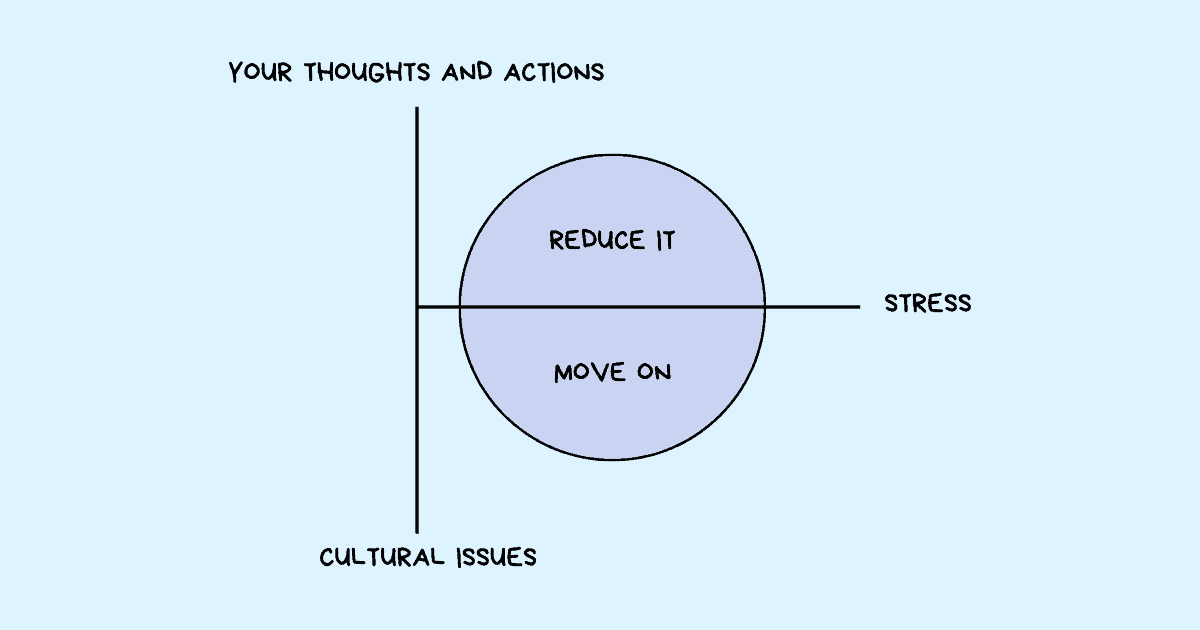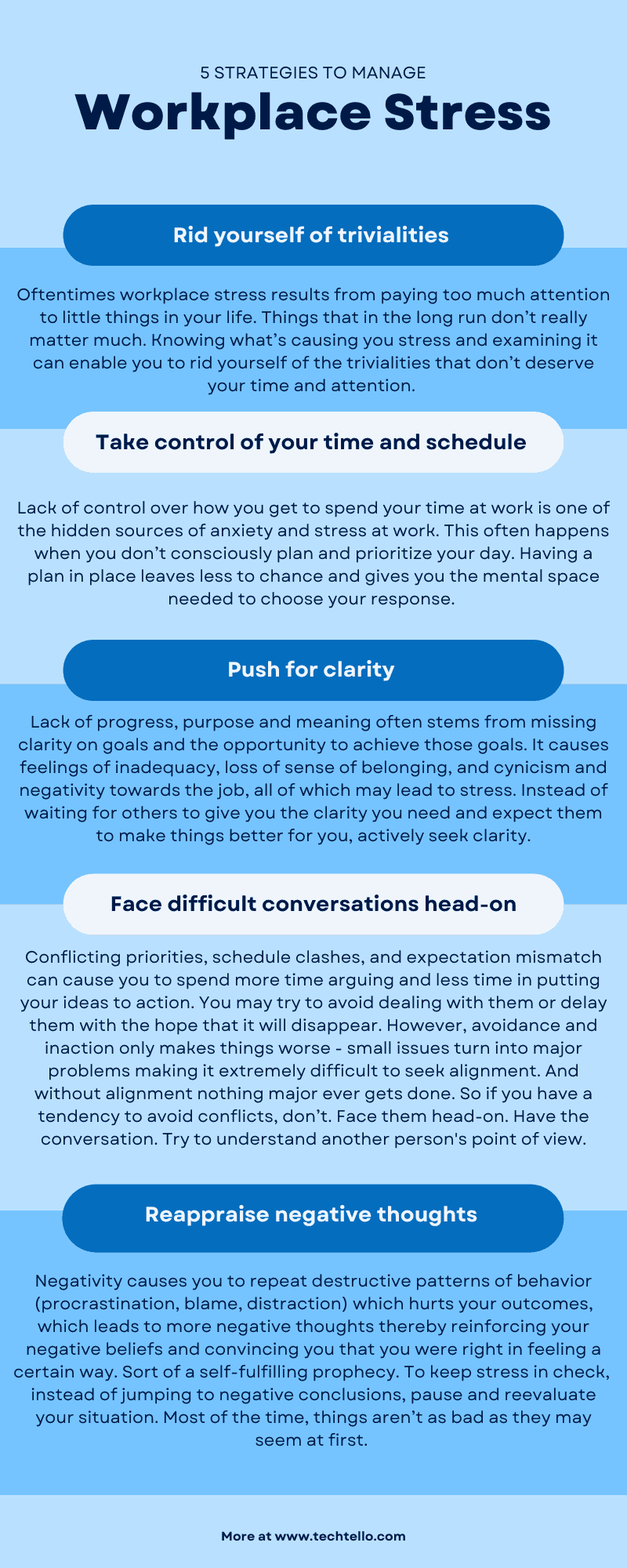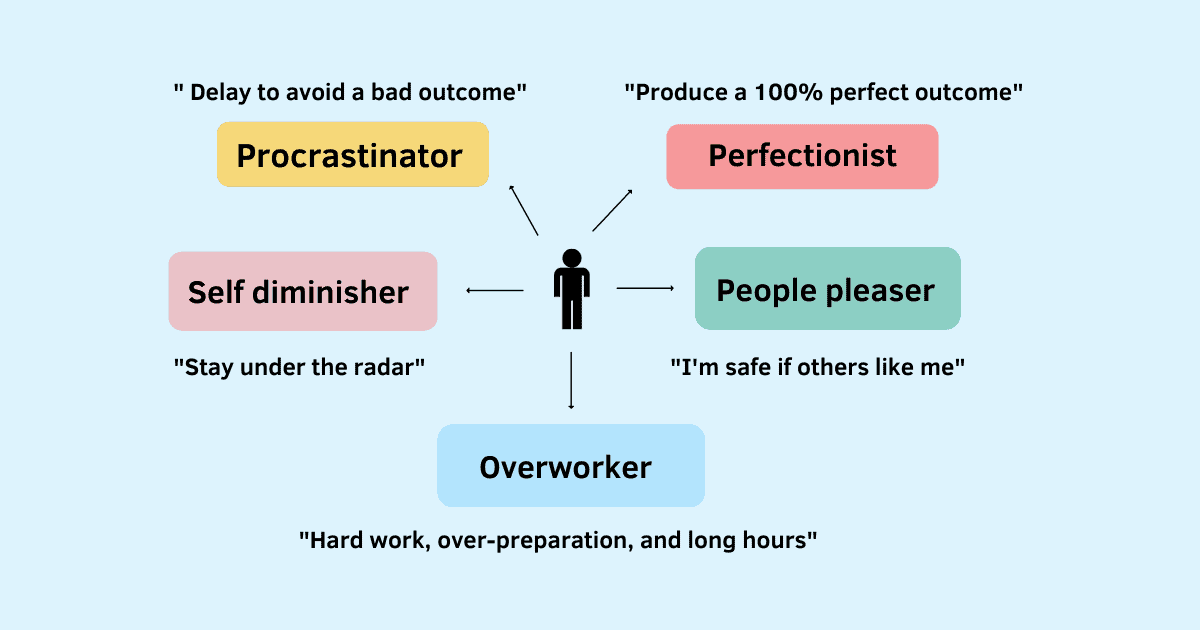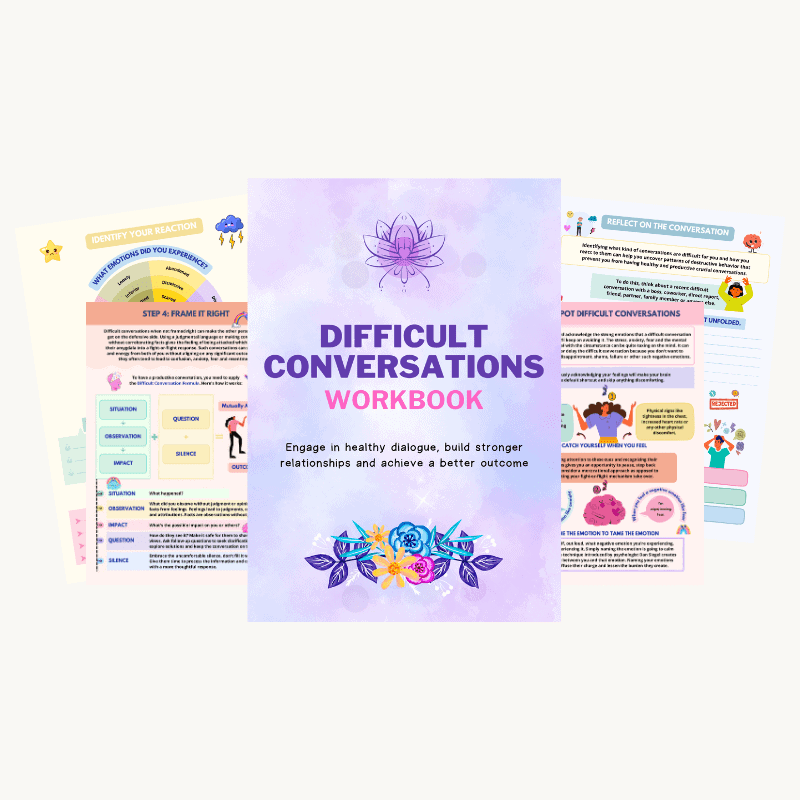Workplace Stress is Costing You. Know How To Reduce It

Work is a big part of our life. Done well, it can be a source of joy. But when managed poorly, it can often lead to stress, anxiety, and dissatisfaction at work.
There’s no getting away with some amount of stress at work and we shouldn’t try to either. After all, all stress is not bad. Oftentimes, it signals you are doing worthwhile work. That you care about adding value and creating an impact. Stress can also energize you enabling you to put in the effort required to make something happen.
But what if your stress is debilitating? What if it gets in the way of making meaningful contributions? What if instead of energizing you, workplace stress sucks into your energy and hurts your motivation?
There can be many reasons for feeling stressed at work.
Some stress may be completely outside your control like the one resulting from some bad people or toxic culture in your organization.
- Power dynamics
- Mean coworkers
- Micromanaging boss
- Excessive work overload
Your other source of stress is in a large part within your control as it relates to your own idiosyncrasies in how you manage and respond to various events at work.
- How do you manage interpersonal conflict?
- What do you do when faced with difficult or otherwise unexpected situations?
- How do you handle aggressive deadlines?
- Is your stress often a result of your procrastination and last-minute scrambling to try and meet an upcoming deadline?
- How do you perform under pressure?
- Are you a perfectionist who sets fairly high standards for yourself and others and feel stressed about not achieving those standards?
- Do you find it hard to focus, often distracted by the things in your environment and later feel stressed about putting in too much time and effort into work, but not achieving the desired outcomes?
- Do you feel like an imposter, worried that others will find out that you are a fraud causing you to overwork to avoid being found out?
- Are you disorganized to an extent that it hurts your productivity causing you to worry and feel stressed about your performance?
- Do you have a habit of multitasking between many things often left feeling disoriented and overwhelmed?
Whatever the reason, research shows that left unhandled, stress can lead to physical and mental health issues. It can impact your productivity and performance at work. It can even impact those around you.
5 strategies to manage workplace stress
I am not going to talk about the stress that comes from things outside your control (bad boss, office politics, other negative cultural elements).
Other than moving on to a better workplace that doesn’t cause you day-to-day stress, I don’t think you have another option. You can crib about these issues all you want, but if your stress results from a larger cultural issue within your organization, it won’t get better with time. You need to take a hard stance, get over your fear of not finding another job and put your time and energy into actually making the switch.
“One of the mistakes many of us make is that we feel sorry for ourselves, or for others, thinking that life should be fair, or that someday it will be. It’s not and it won’t. When we make this mistake we tend to spend a lot of time wallowing and/or complaining about what’s wrong with life. “It’s not fair,” we complain, not realizing that, perhaps, it was never intended to be,” writes Richard Carlson in Don’t Sweat the Small Stuff.
Now let’s talk about things that are within your control. Here are some of the strategies that have worked for me over the years to manage stress on the job.
1. Rid yourself of trivialities
Oftentimes workplace stress results from paying too much attention to little things in your life. Things that in the long run don’t really matter much. Things that you don’t really care about, but may feel like life-and-death decisions in the heat of the moment.
Sometimes, it’s your ego that gets in the way. Other times, you lack the perspective to understand that whatever is the issue at hand doesn’t really deserve your time and attention.
You have many opportunities to isolate yourself from such trivial nuances, but find yourself being more and more trapped by such situations.
To save yourself the mental agony that comes with falling for inconsequential events in your life, ask yourself these questions:
- What’s causing me to feel this way?
- Is this situation within my control?
- Why is it important to me?
- What will happen if I stop caring about it?
- Looking at one year down the line, why does it matter to me right now?
Knowing what’s causing you stress can enable you to rid yourself of the trivialities that don’t deserve your time and attention.
2. Take control of your time and schedule
Lack of control over how you get to spend your time at work is one of the hidden sources of anxiety and stress at work.
A busy schedule with too many meetings and a packed calendar can make you feel important, but it does nothing to advance you in the direction of your goals. Rather, having a hectic day at work without achieving anything significant leaves you feeling inefficient and inadequate.
A stressful morning at home may also get carried to work. Not having enough time to have a healthy breakfast, struggling to drop your kids to school while making it to your meeting on time can honestly be quite stressful. This lack of planning also impacts how you react to various events at work. If you started your day with a stressful morning, even a slight expectation mismatch or discomfort at work may put you off. You may get the feeling that everything around you is falling apart further adding to your feelings of stress and anxiety.
This often happens when you don’t consciously plan and prioritize your day. I am not saying that things can’t go wrong despite planning. However, having a plan in place leaves less to chance and gives you the mental space needed to choose your response.
With better control over your schedule, you get to choose and do work that actually moves you forward leaving less opportunity for stress to creep in.
Eisenhower Productivity Planner Worksheet
Organize your to-dos and clear out unnecessary tasks with the help of this powerful planner.
3. Push for clarity
Feeling ineffective at the job is one of the major sources of burnout at work. If you don’t know what’s expected of you or how your work fits within the goals of your team, it may be hard to achieve anything significant.
Lack of progress, purpose and meaning often stems from missing clarity on goals and the opportunity to achieve those goals. It causes feelings of inadequacy, loss of sense of belonging, and cynicism and negativity towards the job, all of which may lead to stress.
Instead of waiting for others to give you the clarity you need and expect them to make things better for you, actively seek clarity. Your feelings aren’t transparent to others and honestly everyone is so busy with their own agenda at work that it’s extremely hard for them to notice what you need or what you don’t understand.
To avoid stress, push for clarity. Ask questions to better understand your role, job expectations, and goals. Schedule time with your manager to get regular feedback.
Jake Knapp writes in Make Time “Shifting your focus to something that your mind perceives as a doable, completable task will create a real increase in positive energy, direction, and motivation.” Having clarity at work enables that positive shift leaving less room for negativity and stress.
4. Face difficult conversations head-on
A lot of work in organizations requires collaborating across different teams and functions. Collaborating with others definitely creates great opportunities to learn and grow, but it may also come with a lot of stress.
Differences of opinion may lead to disagreements. Conflicting priorities, schedule clashes, and expectation mismatch can cause you to spend more time arguing and less time in putting your ideas to action.
The negative emotions that such conflicts tend to evoke may cause you to bury your head in the sand. You may try to avoid dealing with them or delay them with the hope that it will disappear. However, avoidance and inaction only make things worse – small issues turn into major problems making it extremely difficult to seek alignment. And without alignment, nothing major ever gets done.
Brene Brown says in Rising Strong “The opposite of recognizing that we’re feeling something is denying our emotions. The opposite of being curious is disengaging. When we deny our stories and disengage from tough emotions, they don’t go away; instead, they own us, they define us. Our job is not to deny the story, but to defy the ending—to rise strong, recognize our story, and rumble with the truth until we get to a place where we think, Yes. This is what happened. This is my truth. And I will choose how this story ends.”
So if you have a tendency to avoid conflicts, don’t. Face them head-on. Have the conversation. Try to understand another person’s point of view. Asking these questions can help you deal with your situation and avoid the stress that comes from ignoring them:
- What do I feel – anger, sadness, disgust, fear…
- Why do I feel this way?
- Am I dealing with a conflict?
- How does this feeling affect me at the moment?
- What triggered this conflict?
- What am I trying to achieve or afraid of losing?
- What can make me change my mind?
- What if I am wrong?
- What makes the other person think this way or what am I missing?
5. Reappraise negative thoughts
What happens when things don’t go your way? Isn’t your instant reaction to assume the worst possible outcome? To blow things out of proportion?
Not being mentally prepared to handle the unexpected can through you off-course. Even a small deviation from the normal or a slight change in your circumstance can make you highly anxious and stressed thereby distorting your ability to think clearly.
Negativity also causes you to repeat destructive patterns of behavior (procrastination, blame, distraction) which hurts your outcomes, which leads to more negative thoughts thereby reinforcing your negative beliefs and convincing you that you were right in feeling a certain way. Sort of a self-fulfilling prophecy.
To keep stress in check, whenever you find yourself overwhelmed with negative emotions, do this:
- Let those feelings in. Don’t ignore them.
- Acknowledge that they are just the creation of your mind and may not always be right.
- Question and try to understand what’s making you feel this way. Why do you think you are right in feeling this way? How might you be wrong?
- Re-evaluate the situation. Is it really as bad as it seems? Use other plausible alternatives or explanations to evaluate your situation.
Self-Compassion Workbook
Cultivate kindness and strength in the face of difficulty and foster a new, more gentle and loving perspective on your struggles.
Richard Carlson writes in Don’t Sweat the Small Stuff “We don’t know what’s going to happen—we just think we do. Often we make a big deal out of something. We blow up scenarios in our minds about all the terrible things that are going to happen. Most of the time we are wrong. If we keep our cool and stay open to possibilities, we can be reasonably certain that, eventually, all will be well.”
Summary
- If you don’t understand what causes you stress at work and actively implement measures to keep it in check, it can impact your physical as well as mental well-being thereby hurting your productivity and performance at work.
- Things that lead to stress could be beyond your control like the toxic work culture in an organization. Instead of spending time wallowing in self-pity, make a move.
- Know that a large part of stress stems from things within your control. Acknowledging this fact is the only way to take responsibility for your situation and proactively take steps to reduce it.
- A lot of your stress comes from paying too much attention to trivialities – things that in the long run don’t really matter much. Recognize and separate what’s important from what’s not and stop bothering about petty issues.
- Have a plan in place to consciously spend your time and energy. More control over your schedule leaves less room for stress.
- No doubt you will be stressed if you don’t have a sense of progress, purpose and belonging at work. Actively push for clarity. It gives you the opportunity to bridge that gap thereby enabling happiness, satisfaction and a sense of achievement.
- Instead of avoiding conflicts that tend to worsen the situation, practice the courage to have difficult conversations. You can save yourself and others a lot of stress that comes from unresolved emotions.
- Finally, when things don’t go your way, instead of jumping to negative conclusions, pause and reevaluate your situation. Most of the time, things aren’t as bad as they may seem at first.






























